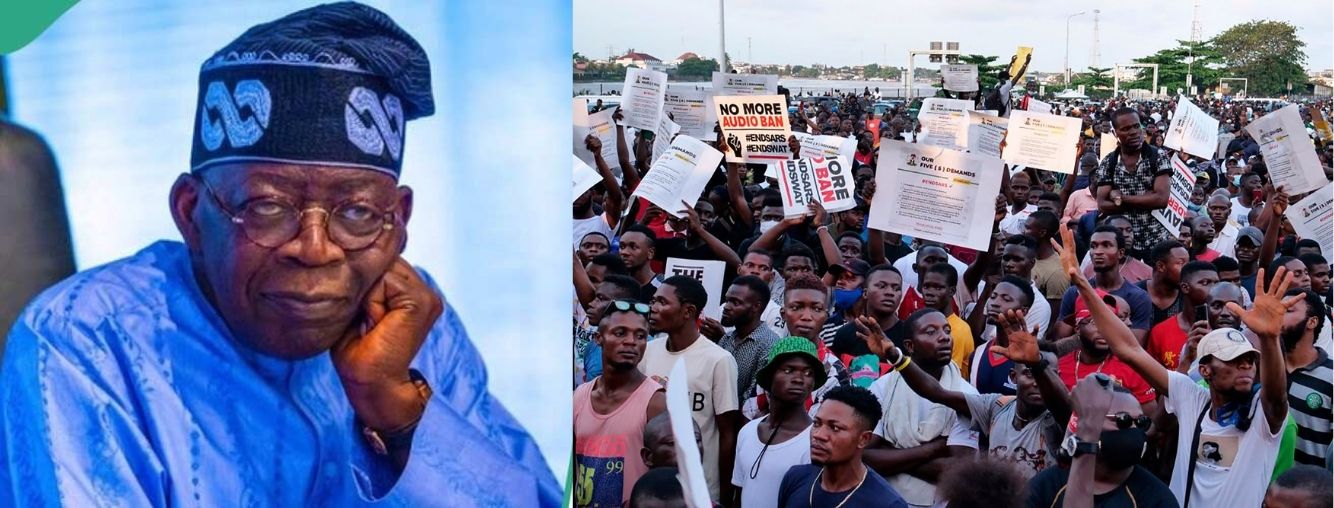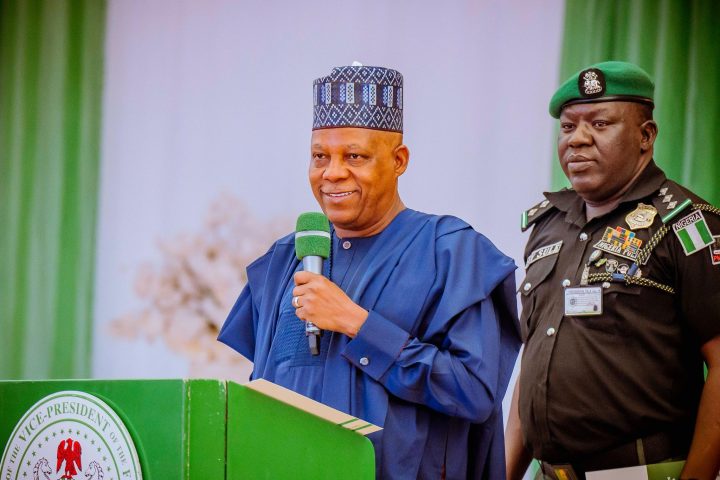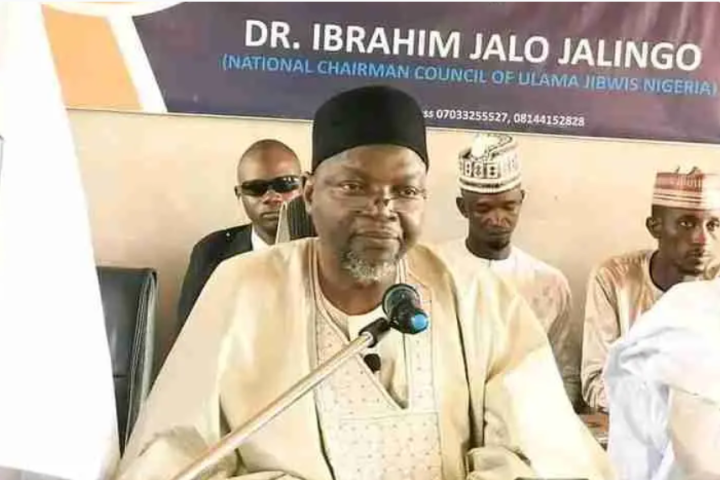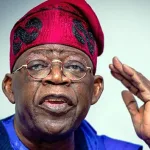The 10 days of rage has set off in Nigeria, and looking at the chants and placards, one can only pity a relatively new Federal Government, which succeeded one of the most poorly performing governments in Nigeria’s history. Clearly, it is unfair to expect President Tinubu to have fixed the destruction of the eight years preceding his government. Insecurity, oil prices, official corruption, food inflation, unemployment, religious and ethnic hatred, violent extremism, terrorism, etc., were raised to new highs just before he took office. Even before 2015, Nigeria had begun a downward spiral, though not on any scale to compare with the heist of 2015 to 2023.
READ ALSO: Just Before The Protests
Join our WhatsApp ChannelUnfortunately, however, people remember the hardships of today, and are angered more by the heightening hardship, instead of hope. So, we agree that things have become harder than before the Tinubu presidency, making people to make unfortunate comparisons between Buhari and Tinubu. But this is where President Tinubu must take important lessons, because early responses from his men to the ongoing protests suggest two things: (1) The administration has continued with their tradition of making things worse, and (2), there is this ominous impression that this government does not know how to do the most ordinary things, suggesting that it acts against its own will.
Correcting Early Mistakes
When the news of planned protests came about a month earlier, many thought it would end like many threats from labour organisations like the Nigeria Labour Congress. Perhaps, government, too, thought this way, because it had enough time to make and implement surface layers reforms like reducing fuel prices. Truly, government quickly announced a new, almost doubled minimum wage, but the process of negotiating it became a key part of the grievances of Nigerians, including utterances from state governors. Government needs more tact and communication coordination in volatile situations. This is why some have questioned the wisdom behind hyping court injunctions about where protesters should not go such as the Eagle Square in Abuja. Government itself sold the idea that the protests would be hijacked by infiltrators, instead of solely promising to support protesters in ensuring that no one becomes violent, and that it could assist the protesters to stop any vandal.
READ ALSO: #EndBadGovernance: Lagos Markets Closed As Business Owners Fear Attack
Government has often made the case that the protest is political, and that Nigerians should give it more time. While one may consider the view that the protests appear heavily politicized judging from where the hottest vibes are happening, the scale of hunger and bad governance in the land obscures any pretext that the protests are being sponsored by Tinubu’s enemies. An African proverb says that at times the actions of an abused person towards a quarrel can give a culprit winning points. Issuance of threats to violent protesters should happen more when such people are caught rather than saying harsh words to peaceful protesters.
The present situation shows that holding town hall meetings to directly engage the ordinary protesters would yield better results than being fixated on allegations of an indirect plot to remove Tinubu. Politicians, traditional and religious rulers had been seen as co-conspirators against the people, making their use to stop the protests unproductive.
After the Protests Began
The protests got off to a slow start across the nation, and the security agencies initially praised the atmosphere. Yet, at the slightest show of high vibes, teargas canisters went off, instigating more violence. At times, it seemed the security agencies wanted to anger the protesters to find a reason to use force to end the protests faster. And once violence entered the fray in five northern states, curfews and shootings heightened, leading to more defiance. The highest level of violence so far has been Thursday’s looting of the NCC Industrial Park in Kano State by hoodlums.
At times, government needs to show really that it feels the pains of the masses beyond saying it. The Senate President, Godswill Akpabio, has come under fire severally for letting out too loose comments. Governor Simi Fubara of Rivers State, while appealing to protesters in Port Harcourt, said: “Here in Rivers State, we will do everything to make life better. But all we need from you is to support the Federal Government. We know there is hunger but just be patient with the government. I will give you a small thing for you to drink pure water.” For this, the protesters yelled humbling words at him, insisting that his peanuts will not stop the hardship.
The police also easily resorted to old tactics of harassing journalists, and seizing and smashing their phones or erasing content before returning them. There are already reports of such incidents meted out to The Punch correspondent, Matthew Ochei, who also said that his colleagues from The Guardian, The Point and Sahara Reporter were accosted for taking pictures of the anti-protest protesters. The journalists reported that the police “insisted that we deleted the photos and recordings before they left us and then smashed our phones. The policemen on duty folded their arms and watched them attack us unchallenged. Fortunately, the reports say that military officers came to their rescue when The Point reporter, Mrs Lucy, said she “sneaked out after she was slapped, [and] immediately rushed to the military officers for intervention.”
READ ALSO: Protesters In Kano Torch, Loot NCC’s Digital Park
A female protester in Abuja openly brandished her baby and dared the police to shoot. She reminded them that bandits had killed her husband in Katsina, and her suffering knew no bounds. According to the unnamed protester: “I came to protest the hardship in Nigeria and the police are shooting teargas at us. Do they also want to kill my baby? People cannot eat. Things are hard.”
By the second day of the protests, at least 300 protesters had been arrested in five northern states when government buildings and properties were looted. At this time too, some estimates put the death toll at 22, all in the north. Amnesty International had earlier reported 13 deaths in three northern states of Niger, Borno and Kaduna, and blamed police for their deaths.
Beyond Suspicion
Government should show, and prove, that it is interested in protecting the angry youth. True, the police behaved very well in some places including Abuja initially, but security agencies should continue to show restraint, especially now that they are reporting their red alertness. While talking about security agencies, Kayode Egbetokun, inspector-general of police (IGP), could also simply offer condolences about dead protesters, and pander to certain sentiments.
Indeed, government’s paranoia about a sinister ploy to unseat Tinubu may not go far enough with the ordinary protester who cares little about politics. Government must move to convince the protester. There are many ordinary things that people have wondered about. It has been said a million times that Nigeria has no business suffering food inflation in a country with a limitless expanse of arable land. Why does it seem impossible for government to show a practical approach to agriculture by ensuring the security of farmers?
What is all this debate about 20 years of no local refinery working? Some recent utterances from government about supplying crude to Dangote Refinery were comforting. Results should be fast to address one of the requests of Nigerians about fuel prices. There can be so much economics about food inflation and foreign exchange. However, a farmer in Bayelsa and Edo, Plateau and Benue, Kano and Jigawa, Enugu, Ebonyi, Ogun and Ekiti will rarely worry about the cost of the dollar if they can go to farm freely and return safely. And that’s why they are protesting.
Dr Mbamalu is a Jefferson Fellow, member of the Nigerian Guild of Editors (NGE) and a renowned Publisher.
Dr. Marcel Mbamalu is a communication scholar, journalist and entrepreneur. He holds a Ph.D in Mass Communication from the University of Nigeria, Nsukka and is the Chief Executive Officer Newstide Publications, the publishers of Prime Business Africa.
A seasoned journalist, he horned his journalism skills at The Guardian Newspaper, rising to the position of News Editor at the flagship of the Nigerian press. He has garnered multidisciplinary experience in marketing communication, public relations and media research, helping clients to deliver bespoke campaigns within Nigeria and across Africa.
He has built an expansive network in the media and has served as a media trainer for World Health Organisation (WHO) at various times in Northeast Nigeria. He has attended numerous media trainings, including the Bloomberg Financial Journalism Training and Reuters/AfDB training on Effective Coverage of Infrastructural Development of Africa.
A versatile media expert, he won the Jefferson Fellowship in 2023 as the sole Africa representative on the program. Dr Mbamalu was part of a global media team that covered the 2020 United State’s Presidential election. As Africa's sole representative in the 2023 Jefferson Fellowships, Dr Mbamalu was selected to tour the United States and Asia (Japan and Hong Kong) as part of a 12-man global team of journalists on a travel grant to report on inclusion, income gaps and migration issues between the US and Asia.



















Follow Us